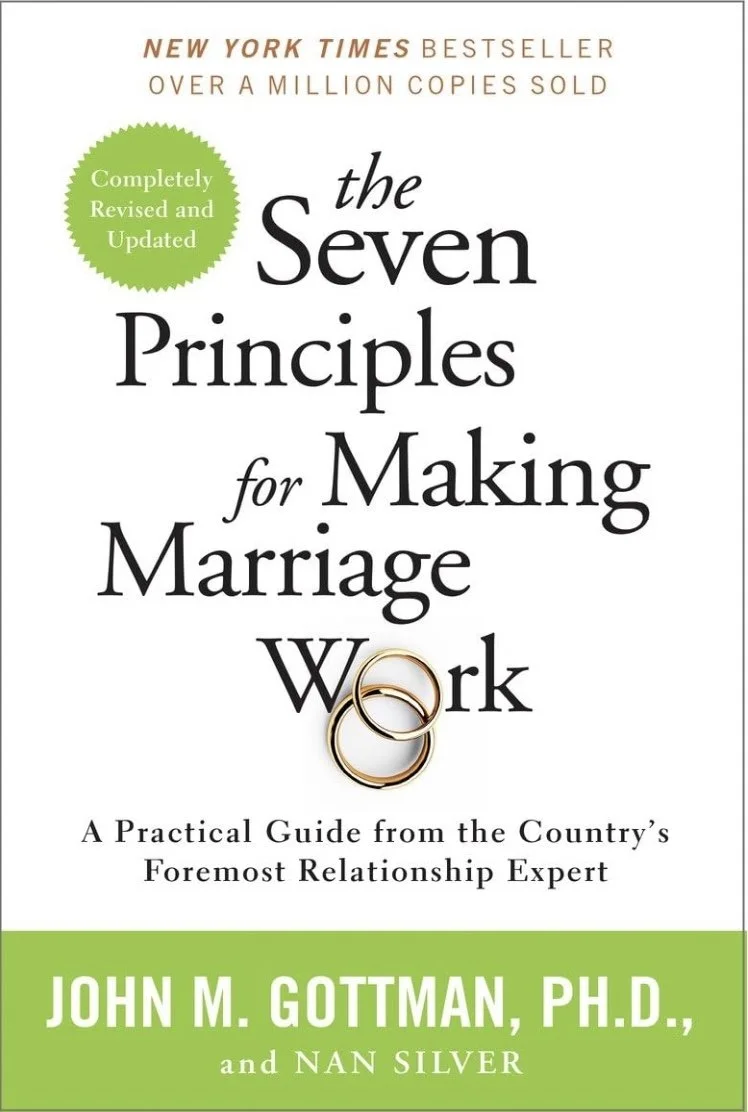The Seven Principles for Making Marriage Work
by John M. Gottman and Nan Silver
Key Principles and Insights
1. Enhance Your Love Maps:
Love maps refer to our internal understanding of all the relevant information about our partner’s life. To strengthen your relationship, it's crucial to know your partner's likes, dislikes, hopes, dreams, and fears. Keeping updated love maps ensures deep emotional intimacy and understanding.
2. Nurture Your Fondness and Admiration:
Maintaining a sense of respect and affection for your partner is essential. Couples should regularly express appreciation and admiration for each other. This positive perspective helps couples weather conflicts and challenges more effectively.
3. Turn Toward Each Other Instead of Away:
Everyday interactions, or "bids for connection," play a significant role in relationship health. Turning toward your partner means engaging positively with these bids, such as showing interest, affection, and support. Consistently turning toward each other fosters connection and emotional intimacy.
4. Let Your Partner Influence You:
Successful marriages involve mutual respect and shared decision-making. Allowing your partner to influence you means being open to their ideas, perspectives, and needs. This principle emphasizes the importance of equality and cooperation in the relationship.
5. Solve Your Solvable Problems:
Not all conflicts can be resolved, but many can be managed. Gottman identifies effective conflict resolution strategies, including:
Soft Start-Up: Begin discussions gently without criticism or blame.
Repair Attempts: Use humor or other tactics to de-escalate tension.
Self-Soothing: Take breaks and calm down if needed.
Compromise: Find solutions that work for both partners.
Tolerate Differences: Accept that some problems are perpetual and focus on managing them rather than solving them entirely.
6. Overcome Gridlock:
Gridlock occurs when couples repeatedly argue about the same issues without resolution. Overcoming gridlock involves understanding the underlying dreams and aspirations that fuel these conflicts. Couples should explore these deeper issues and find ways to honor each other’s dreams within the relationship.
7. Create Shared Meaning:
Building a sense of shared purpose and meaning strengthens the marital bond. This involves creating rituals, traditions, and shared goals that reflect the couple’s values and aspirations. Developing a shared narrative and vision for the future enhances connection and commitment.
Additional Insights
Sound Relationship House Theory:
Gottman introduces the "Sound Relationship House" as a framework for understanding healthy relationships. It includes building love maps, nurturing fondness and admiration, turning toward each other, managing conflict, making life dreams come true, and creating shared meaning.
The Role of Positive Sentiment Override:
In successful marriages, positive interactions outweigh negative ones by a significant margin. Gottman’s research highlights the importance of maintaining a high ratio of positive to negative interactions (ideally 5:1) to keep the relationship resilient and positive.
Understanding and Managing Conflict:
Gottman distinguishes between solvable problems and perpetual problems. While solvable problems can be addressed through effective communication and problem-solving techniques, perpetual problems require ongoing dialogue and acceptance.
Conclusion
"The Seven Principles for Making Marriage Work" offers practical, research-backed advice to help couples strengthen their relationships. By enhancing emotional intimacy, nurturing respect and admiration, managing conflicts constructively, and building a shared sense of meaning, couples can create a fulfilling and enduring marriage. Dr. John Gottman’s extensive research and insightful principles provide a comprehensive guide for anyone seeking to improve and sustain their marital relationship.

